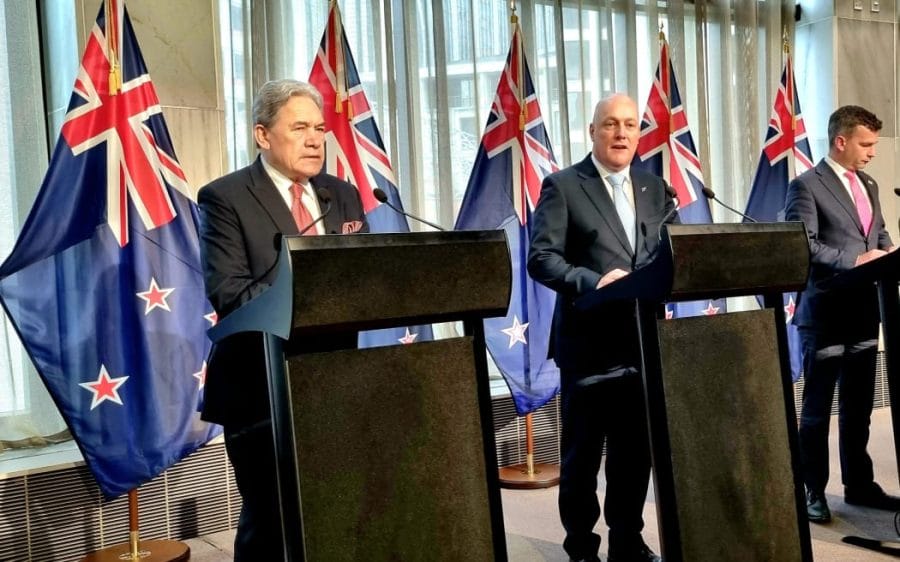NZ First leader Winston Peters will be the deputy prime minister for the first half of the incoming National coalition government’s term, followed by David Seymour for the second half.
Related: New Government Ministers – Who Gets What
It comes as National leader and incoming prime minister Christopher Luxon, alongside Peters and Seymour, released the coalition agreement this morning.
The coalition will be a three-party one, the first in New Zealand’s MMP history.
National’s proposed foreign buyer tax – part of its plan to fund tax cuts – will no longer go ahead, with National saying it will fund the cuts from elsewhere. Interest deductibility will be returned at a faster pace than floated by National in the election campaign.
Peters will take on the role until May 31, 2025. Seymour will then become deputy prime minister until the end of the three-year term.
Peters will also be the Minister for Foreign Affairs, and Seymour the Minister for Regulation.
Incoming prime minister Christopher Luxon said New Zealanders had put their trust in the National Party and in return it trusted New Zealand.
“We believe in this country. We are ambitious for it. We know that, with the right leadership, the right policies and the right direction, together New Zealanders can make this an even better country.”
The 20-strong Cabinet will have 14 National Ministers, three ACT Ministers and three New Zealand First Ministers.
Nicola Willis will be Minister of Finance, Brooke van Velden will be Minister for Workplace Relations and Safety and Hon Shane Jones will be Minister for Regional Development.
There will be five ministers from National, two from ACT and one from New Zealand First outside Cabinet.
ACT and New Zealand First will each have one Parliamentary Under-Secretary.
“The Government will manage a strong economy that will ease the cost of living and deliver tax relief, restore law and order, deliver better public services and strengthen democracy,” Luxon said.
“The coalition documents between National and ACT, and National and New Zealand First, provide for both ACT and New Zealand First to support the major elements of National’s policy programme including our 100-day plan, our 100-point economic plan, and our tax and fiscal plans, with some adjustments.
“The National and ACT agreement provides that the Government will progress a range of ACT initiatives, and these will be supported by New Zealand First. Equally, the National and New Zealand First coalition agreement outlines a range of New Zealand First priorities, which will be supported by ACT.
“The coalition parties believe people should be rewarded for their effort and hard-working Kiwis should keep more of what they earn. National campaigned on that commitment and, next July, the Government will deliver it.
“The tax package will continue to be funded through a combination of spending reprioritisation and additional revenue measures.
“However, as part of National’s agreement with New Zealand First, the proposed foreign buyer tax will no longer go ahead. Policy changes will help offset the loss of revenue from that change. National’s fiscal plan also had buffers which give confidence that tax reduction can still be funded responsibly.
“The coalition parties have adopted ACT’s policy to speed up the rate at which interest deductibility for rental properties is restored.
“Delivering tax relief is just one part of the Government’s plan to rebuild the economy. The Government will ease the cost of living, reduce wasteful spending, and lift economic growth to increase opportunities and prosperity for all New Zealanders.”
“Restoring law and order will be as important to the Government as it is to the public. In addition to National’s policies to tackle gangs and youth crime, the parties have agreed with ACT to re-write the Arms Act, and agreed with New Zealand First to train no fewer than 500 new Police.
“Part of treating taxpayers’ money with respect is getting better value from public services. We will set targets, like shorter wait times in hospitals, and public services will be delivered on the basis of need.
“To lift educational performance, every class will undertake an hour a day each of reading, writing and maths. The parties have agreed to adopt ACT’s policies to reintroduce partnership schools and to allow state schools to become partnership schools.
Other key policies in the agreements included a new agency, accountable to the Minister for Regulation, will assess the quality of new and existing regulation. This agency, proposed by ACT, will be funded by disestablishing the Productivity Commission
A Regional Infrastructure Fund, proposed by New Zealand First, that will have $1.2 billion in capital funding.
Source: 1News

